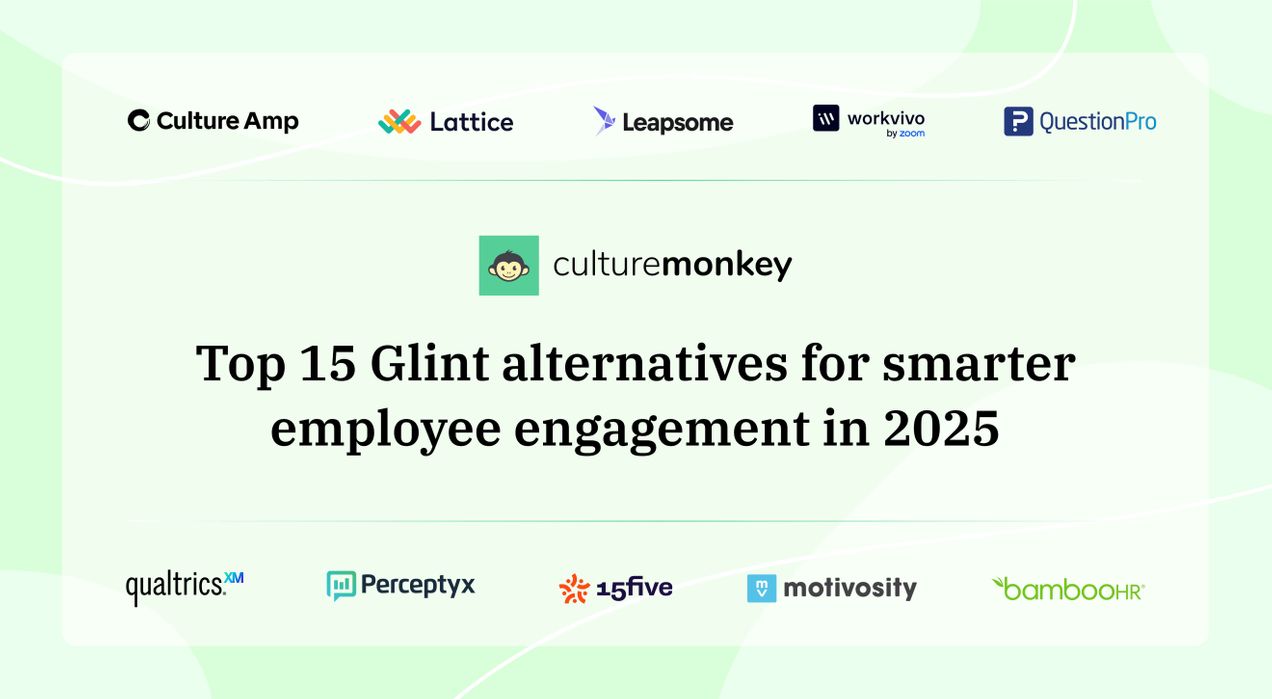13 Employee engagement workshop ideas to elevate your workplace culture in 2025

Imagine a garden filled with diverse plants—each requiring unique care to thrive. Some need abundant sunlight, others shade. Some grow tall and strong with minimal effort, while others flourish only when nurtured with patience. This garden mirrors your workplace, where every employee represents a distinct plant.
Just as a gardener invests time and energy to cultivate a healthy ecosystem, leaders must foster a positive culture of engagement to ensure employees bloom to their fullest potential.
This is where employee engagement workshops come in. Much like a gardener’s toolkit, these workshops provide the strategies, insights, and resources to nurture talent, enhance team dynamics, and cultivate a thriving workplace culture. They go beyond theoretical learning, offering practical, interactive experiences that help employees feel valued, connected, and motivated to succeed.
Whether you’re aiming to boost collaboration, address workplace challenges, or refine leadership through an employee engagement training program for managers, workshops hold the key. In this blog, we explore actionable ideas to elevate your employee engagement strategies and transform your workplace into a flourishing garden of productivity and purpose.
What is an employee engagement workshop?

An employee engagement workshop is an interactive session designed to strengthen the connection between employees and their organization. These employee workshops aim to foster trust, collaboration, and motivation among engaged employees by addressing workplace challenges, building skills, and enhancing team dynamics.
Through activities, discussions, and employee trainings, they help employees feel more valued, engaged, and aligned with organizational goals.
At their core, these workshops are not just about learning; they’re about action. By focusing on real-world scenarios and interactive exercises, they encourage employees to share ideas, voice concerns, and co-create solutions.
Whether it’s enhancing communication, developing leadership, or nurturing a sense of belonging in person together, the outcomes often include improved morale, stronger teamwork, and increased productivity.
Organizations can tailor employee engagement surveys and workshops to specific objectives, such as boosting collaboration, resolving conflicts, or strengthening leadership. They can also incorporate elements of employee engagement training programs, focusing on both personal and professional growth.
By investing in tailored employee engagement training courses, companies can foster a culture of continuous improvement and mutual respect. Ultimately, an employee engagement workshop empowers individuals and teams to thrive while contributing to the long-term success of the workforce and the organization.
Why are employee engagement workshops essential?

Employee engagement programs are more than just team-building exercises—they are strategic tools for fostering motivation, collaboration, and innovation. These workshops address disengagement and provide actionable solutions to improve workplace dynamics. Here’s why they are indispensable for modern organizations:
Boost employee morale
Engagement workshops provide both benefits and a platform for employees to feel recognized and valued. Activities that celebrate achievements and foster camaraderie can significantly lift spirits. When morale is high, employees are more enthusiastic and motivated in their roles. This ultimately creates a more positive and productive workplace atmosphere.
Enhance team collaboration
Workshops and employee engagement courses help you create opportunities for employees to connect and communicate effectively. Through group exercises and discussions, they build trust and understanding among team members. This strengthens relationships and helps teams work cohesively, even during challenging situations. Improved collaboration results in better problem-solving and project outcomes.
Improve productivity
Employees who are engaged tend to be more focused and committed to their tasks. Workshops equip them with tools and techniques to manage time, prioritize effectively, and stay motivated. By addressing disengagement and fostering accountability, these sessions directly contribute to enhanced productivity across higher levels of the organization.
Develop leadership skills
For managers, workshops can include employee engagement training programs tailored to leadership development. These sessions teach skills like effective communication, motivation, and conflict resolution. Leaders emerge better equipped to guide their teams and Foster a culture of growth. Strong leadership has a trickle-down effect on overall team engagement levels.
Strengthen organizational culture
Workshops reinforce the company’s mission, values, and goals, ensuring employees feel connected to the larger purpose. When teams align with the organization’s vision, it fosters a sense of belonging. This strengthens the overall workplace culture, leading to higher retention rates and job satisfaction rates.
Address employee concerns
Engagement workshops provide a safe space for employees to voice their concerns and share feedback. Facilitators can address these issues constructively and work towards actionable solutions. This creates a culture of openness and transparency, helping employees feel heard and appreciated. It also builds trust within the organization.
Drive innovation
Workshops often encourage creative brainstorming and new approaches to solving business problems. By fostering a culture of innovation, employees feel empowered to contribute their ideas. Engaged teams are more likely to think outside the box, leading to innovative solutions that can drive business growth.
How do workshops contribute to employee engagement training?

- Foster practical skill development: Workshops provide hands-on activities that bridge the gap between theory and practice. Employees learn actionable skills like conflict resolution, emotional intelligence, and time management. This direct application helps them integrate what they’ve learned into their daily work, enhancing overall engagement.
- Encourage cross-departmental collaboration: Unlike routine meetings, workshops bring together employees from various departments. This fosters new connections, broadens perspectives, and encourages knowledge sharing. These interactions build a sense of community and strengthen engagement across the organization.
- Support continuous learning: Workshops integrate seamlessly into an organization’s ongoing employee engagement training program. They provide periodic opportunities for employees to update their knowledge, develop new competencies, and stay motivated. A culture of continuous learning keeps employees engaged and invested in their roles.
- Tailor solutions to specific challenges: Each workshop can focus on addressing unique workplace challenges, such as adapting to change or improving communication. Customized solutions ensure that employees feel their needs are understood and prioritized. This level of personalization increases engagement and loyalty.
- Measure and reinforce progress: Workshops can incorporate feedback mechanisms to gauge the effectiveness of employee engagement training. Real-time discussions and follow-up activities help identify areas of improvement and celebrate progress. This ongoing evaluation reinforces learning and encourages sustained engagement.
Common mistakes to avoid when conducting engagement workshops

Missteps can lead to disengagement, wasted resources, or even employee frustration. Here are common mistakes to avoid to ensure your workshops are impactful and meaningful:
- Lack of clear objectives: Failing to define specific goals for the workshop leads to confusion and lackluster outcomes. Employees need to understand the purpose and expected results to stay engaged. A well-defined agenda ensures that the session remains focused and productive.
- Neglecting participant input: Workshops that ignore employee input risk feeling irrelevant or disconnected. When participants aren’t consulted about their needs or concerns, the content may fail to resonate. Engaging employees in the planning process fosters a sense of ownership and alignment.
- Overloading content: Packing too much information into a single session overwhelms participants and reduces retention. Workshops should focus on a few key topics, allowing time for discussion and application. A balanced agenda ensures deeper understanding and sustained engagement.
- Using passive formats: Relying solely on lectures or presentations can disengage participants. Workshops should include interactive elements like group discussions, role-playing, or problem-solving exercises. Active participation keeps employees involved and maximizes the learning experience.
- Ignoring follow-up actions: Without follow-up, workshops risk becoming one-time events with little impact. Employees need actionable takeaways and continued support to apply what they’ve learned. Regular check-ins and reinforcement activities ensure Long-term engagement and progress.
- Failing to adapt to the audience: Using a one-size-fits-all approach overlooks the diverse needs of employees. A workshop that feels too generic or mismatched to the audience can alienate participants. Tailoring content to the team’s roles, experience levels, and challenges is crucial.
- Poor facilitation: Inexperienced or unprepared facilitators can derail even the best-planned workshop. Effective facilitators should be engaging, knowledgeable, and skilled in managing group dynamics. Choosing the right person to lead the session is key to its success.
How to host an employee engagement workshop: 7 Best practices to follow

Hosting an employee engagement workshop requires thoughtful planning and execution to ensure it resonates with participants. By focusing on engagement, relevance, and actionable insights, these sessions can drive meaningful results. Here are seven best practices to follow:
- Align workshop goals with organizational objectives: Define how the workshop ties into the company’s broader goals, like enhancing collaboration or boosting innovation. Clear alignment makes the session more purposeful and impactful. Employees are more invested when they understand the bigger picture.
- Incorporate real-life scenarios: Use relatable examples and case studies to make the content practical and engaging. Activities like role-playing or scenario-based problem-solving connect learning to everyday work. This ensures employees see the relevance of their participation.
- Promote active participation: Encourage group discussions, brainstorming, and interactive activities to engage participants. Active involvement fosters collaboration and helps employees feel valued. The more they contribute, the more invested they become in the outcomes.
- Offer flexible formats: Blend in-person workshops with virtual or self-paced modules to cater to diverse learning preferences. Flexibility allows employees to engage in ways that suit them best. This approach ensures higher participation and retention.
- Integrate technology to enhance engagement: Use tools like live polls, breakout rooms, and gamified elements to make sessions interactive. Technology can engage remote teams and enhance participation. It also helps track feedback for improving future workshops.
- Include leadership participation: Involve managers or senior leaders to emphasize the importance of the workshop. Their presence inspires employees and aligns the workshop with organizational priorities. Leaders can share insights and model engagement behaviors.
- Provide clear and actionable takeaways: Conclude with specific steps employees can apply immediately in their roles. Provide follow-up resources or actionable plans to reinforce learning. This ensures the workshop’s lessons lead to tangible workplace improvements.
13 Employee engagement workshops ideas & activities to boost engagement at work

Here are 13 creative ideas and activities to boost employee engagement higher productivity in the workplace:
- Team building challenges: Organize problem-solving activities that require teamwork, such as escape rooms or outdoor challenges. These exercises strengthen collaboration, trust, and communication among team members, boosting engagement through shared experiences.
- Role reversal activities: Encourage employees to step into each other’s roles for a day to foster empathy and better understand each other’s challenges. This activity helps break down silos and improves communication across departments.
- Brainstorming sessions: Host creative brainstorming sessions where employees can propose ideas for improving processes or products. This encourages innovation and gives employees a voice in shaping the company’s future, making them feel valued.
- Skills development workshops: Offer workshops that focus on both soft and hard skills, such as leadership, communication, or data analysis. This not only boosts employee confidence but also contributes to their professional growth, increasing engagement in their roles.
- Wellness workshops: Provide sessions on stress management, mindfulness, or nutrition. These workshops show employees that you care about their well-being, fostering a healthier and more engaged workforce.
- Feedback and recognition sessions: Host workshops that teach employees how to give and receive feedback effectively. Incorporating regular recognition into these sessions ensures employees feel appreciated and motivated to contribute to the team’s success.
- Job rotation programs: Allow employees to rotate through different roles within the company, learning new skills and perspectives. This variety keeps work exciting and helps employees stay engaged by preventing monotony.
- Company culture workshops: Facilitate workshops focused on reinforcing company values and culture. Engage employees in discussions on how they can contribute to a positive and inclusive environment, fostering a sense of belonging.
- Vision and strategy workshops: Align employees with the company’s vision and strategic objectives through workshops that explain organizational goals and how each employee plays a role in achieving them. This helps employees feel more connected to the company’s mission.
- Innovation hackathons: Host hackathons where teams collaborate on innovative projects or solutions in a limited time. This encourages creativity and allows employees to contribute in a fun and energetic setting.
- Conflict resolution workshops: Offer workshops on conflict management and negotiation skills. Providing tools for resolving conflicts creates a more harmonious work environment, which keeps employees engaged and focused on their work.
- Diversity and inclusion training: Provide workshops that promote diversity, equity, and inclusion in the workplace. These sessions help employees feel respected and valued, which increases their commitment and engagement with the company.
- Mentorship programs: Create mentorship programs where experienced employees guide newcomers. This strengthens relationships, builds a supportive environment, and encourages engagement through professional development.
Key topics to cover in an employee engagement workshop

A well-designed employee engagement workshop should address core topics that resonate with employees’ needs and organizational goals. These workshops should offer actionable insights and practical tools to drive engagement. Here are key topics to include:
- The importance of emotional intelligence (EQ): Explore how emotional intelligence influences workplace dynamics, leadership, and team cohesion. Teach employees how to manage emotions, empathize with colleagues, and communicate effectively to Foster a positive work environment.
- Building psychological safety at work: Discuss the value of creating a workplace where employees feel safe to express ideas, take risks, and voice concerns without fear of judgment. Highlight strategies for leaders and teams to build trust and openness.
- The role of autonomy in engagement: Focus on how giving employees more control over their work fosters accountability and innovation. Address ways to delegate effectively and provide the right balance between guidance and independence.
- The science of motivation: Dive into the psychological factors that drive employee motivation, such as intrinsic versus extrinsic rewards. Provide practical tips for leaders to tap into individual motivators and sustain enthusiasm over time.
- Adapting to hybrid work models: Examine how to maintain engagement in a hybrid or remote work setting. Discuss tools, practices, and communication strategies that ensure inclusion and connection across dispersed teams.
- Leveraging strengths for better performance: Help employees identify and apply their unique strengths to their roles. Highlight how focusing on strengths increases job satisfaction, productivity, and team synergy.
- Developing resilience in the workplace: Address the importance of resilience in handling workplace challenges, change, and setbacks. Offer techniques to build mental toughness and Foster a growth mindset within teams.
What to look for in an employee engagement training program for managers?

Managers play a pivotal role in shaping employee engagement, making it essential to equip them with the right tools and skills. A robust training program should empower managers to lead with empathy, foster collaboration, and drive engagement within their teams. Here are five key aspects to consider:
1. Focus on leadership communication
The program should teach managers effective communication strategies to inspire and motivate their teams. This includes active listening, clear messaging, and handling sensitive discussions with tact. Strong communication fosters trust and connection.
2. Building coaching and mentorship skills
Look for programs that train managers to coach and mentor employees for professional growth. These skills help managers guide their teams, identify strengths, and provide constructive feedback. A mentorship mindset strengthens workplace bonds.
3. Emphasis on conflict resolution techniques
The program should include practical tools for resolving workplace conflicts constructively. Training in mediation and problem-solving enables managers to maintain harmony and keep their teams focused. Resolving issues effectively promotes a healthy work culture.
4. Personalization for diverse team needs
Ensure the training program teaches managers how to adapt their approaches to suit diverse team dynamics. This includes addressing generational, cultural, or skill-level differences. Personalized management enhances inclusivity and engagement.
5. Focus on measuring and sustaining engagement
A good program helps managers understand engagement metrics and track progress. It should also provide strategies to maintain and improve engagement levels over time. Sustained engagement ensures long-term team success.
Leveraging employee surveys to understand the results of engagement workshops

Employee surveys are a powerful tool for gauging the effectiveness of various engagement initiatives and workshops. They provide actionable insights into employee perspectives, highlight areas for improvement, and validate the impact of initiatives. Here are five ways to use surveys effectively to evaluate workshop outcomes:
- Assess immediate feedback on workshop content: Use post-workshop surveys to collect employees’ thoughts on the session’s relevance, clarity, and engagement. Ask targeted questions about specific activities or topics. This feedback helps refine future workshops for greater impact.
- Gauge changes in employee sentiment: Conduct follow-up surveys to track shifts in morale, satisfaction, or motivation after the workshop. Compare pre- and post-workshop data to identify tangible improvements or persistent challenges. This shows how well the workshop met its goals.
- Evaluate skill application in the workplace: Survey employees on their ability to apply new skills or knowledge gained from the workshop. Include questions about challenges or successes in implementation. This highlights practical outcomes and areas needing additional support.
- Identify long-term impact on engagement: Use periodic surveys to assess how workshops have influenced engagement levels over time. Analyze trends in metrics like productivity, collaboration, or job satisfaction. This ensures workshops contribute to sustained cultural change.
- Tailor future initiatives based on insights: Leverage survey data to design more targeted workshops that address unmet needs. Use open-ended questions to gather suggestions for future topics. Employee-driven improvements make workshops more meaningful and impactful.
Conclusion
Employee engagement workshops are a cornerstone of building a thriving workplace culture where employees feel valued, motivated, and aligned with organizational goals.
By designing workshops with intention, addressing diverse needs, and continuously refining through feedback, organizations can foster a culture of growth and collaboration. To maximize the impact of these efforts, it’s essential business leaders to measure their effectiveness through reliable tools like employee surveys.
Ready to take your engagement strategy to the next level? CultureMonkey offers a comprehensive understanding and cutting-edge solutions to gather, analyze, and act on employee feedback, ensuring your workshops drive meaningful change. Explore how CultureMonkey can help transform your workplace culture into one that inspires and empowers every employee.



